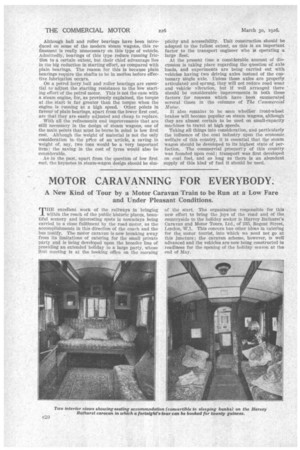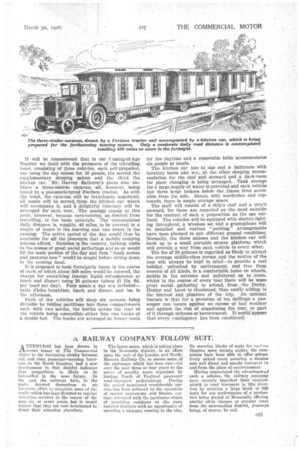MOTOR CARAVANNING FOR EVERYBODY.
Page 18

Page 19

If you've noticed an error in this article please click here to report it so we can fix it.
A New Kind of Tour by a Motor Caravan Train to be Run at a Low Fare and Under Pleasant Conditions.
TIIE excellent work of the railways in bringing within the reach of the public historic Places, beautiful scenery and interesting spots is nowadays .being carried to a close fulfilment by the road motor, as the accomplishments in this direction of the coach and the bus testify. The motor caravan is now breaking away from its limitations of catering for the small private party and is being developed upon the broader line of providing an extended holiday to a large party, whose first meeting is at the booking office on the morning
of the start.The organization responsible for this new effort to bring the joys of the road and of the countryside to the holiday seeker is Harvey Bathurst's Caravan and Motor Tours, Ltd., of 235, Regent Street, London, W.I. This concern has other ideas in catering for the_ motor tourist, into which we need not go at this juncture; the caravan scheme, however, is well advanced and the vehicles are now being constructed in readiness for the opening of the holiday season at the end of May.
It will be remembered that in our coming-of-Age Number we dealt with the prospects of the travelling hotel, consisting of three vehicles, each self-propelled, one being the day saloon for 16 people, the second the supplementary sleeping saloon and the third the kitchen car. Mr. Harvey Bathurst's plans also embrace a three-vehkie caravan, all, however, being towed by a pneurnatic-tyred Fordson tractor. As with the hotel, the caravan will be luxuriously appointed, all meals will be servedl from the kitchen car which will accompany it, and a delightful itinerary will be arranged for each tour. The analogy teases at this point, however, because caravanning, as distinct from travelling, IS the basic principle. The contemplated daily distance is, roughly, 40 miles, to be covered in a. couple of hours in the morning and two hours in the evening. The active period of the day would thus be available for all the pleasures that a mobile camping scheme afford. Rambles in the country, bathing, visits to the scenes of great social gatherings and so on would fill the main portion of the day and then "fresh scenes and pastures new" would be sought before sitting down to the evening meal.
It is proposed to book fortnightly tours, in the course of each of which about -500 miles would be covered, the charge for everything (except liquid refreshments at lunch and dinner) being 20 guineas (about fi 12s. ed. per head per day). Four meals a day are included— table d'h6te breakfast, lunch and dinner, and tea in the afternoon.
Each of the vehicles will sleep six persons, being divisible by folding partitions into three compartments each with two berths, the berths across the rear ot the vehicle being convertible either into two bunks or a double bed. The bunks are arranged as lounge seats for the daytime and a removable table accommodates six people at meals. The kitchen ear has at one end a bathroom with
lavatory basin and at the other sleeping accommodation for the chef and steward and a dark-room for plate changing is being arranged. Tank storage for a large supply of water is provided and each vehicle has three large lockers below the frame level accessible from the side. Hence, with wardrobes and cupboards, there is ample storage space.
The staff will consist of a ship's chef and a ship's steward, for these are regarded as the most suitable for the conduct of such a proposition as the one outlined. The vehicles will be equipped with electric lighting throughout, a wireless set and a gramophone will be installed and various "parking" arrangements have been planned to suit different ground conditions. Normally, the three saloons and the kitchen car will back up to a small portable square platform, which will provide a way from each vehicle to every other.
The fee of 20 guineas is regarded as likely to attract the average middle-class person and the motive of the tour will always be kept in mind—to provide a real holiday, unlimited by environment, and free from worries of all kinds, in a comfortable home on wheels, mobile in the extreme and unfettered as to route, whilst in the course of every tour there will be some great social gathering to attend, from the Derby, Henley and Ascot to Goodwood, thus vastly adding to the interest and pleasure of the trip. An unusual feature is that for a premium of ten shillings a passenger can insure against an excess of bad weather and against the risk of abandoning the tour, or part of it through sickness or bereavement. It would appear that every contingency has been considered.


































